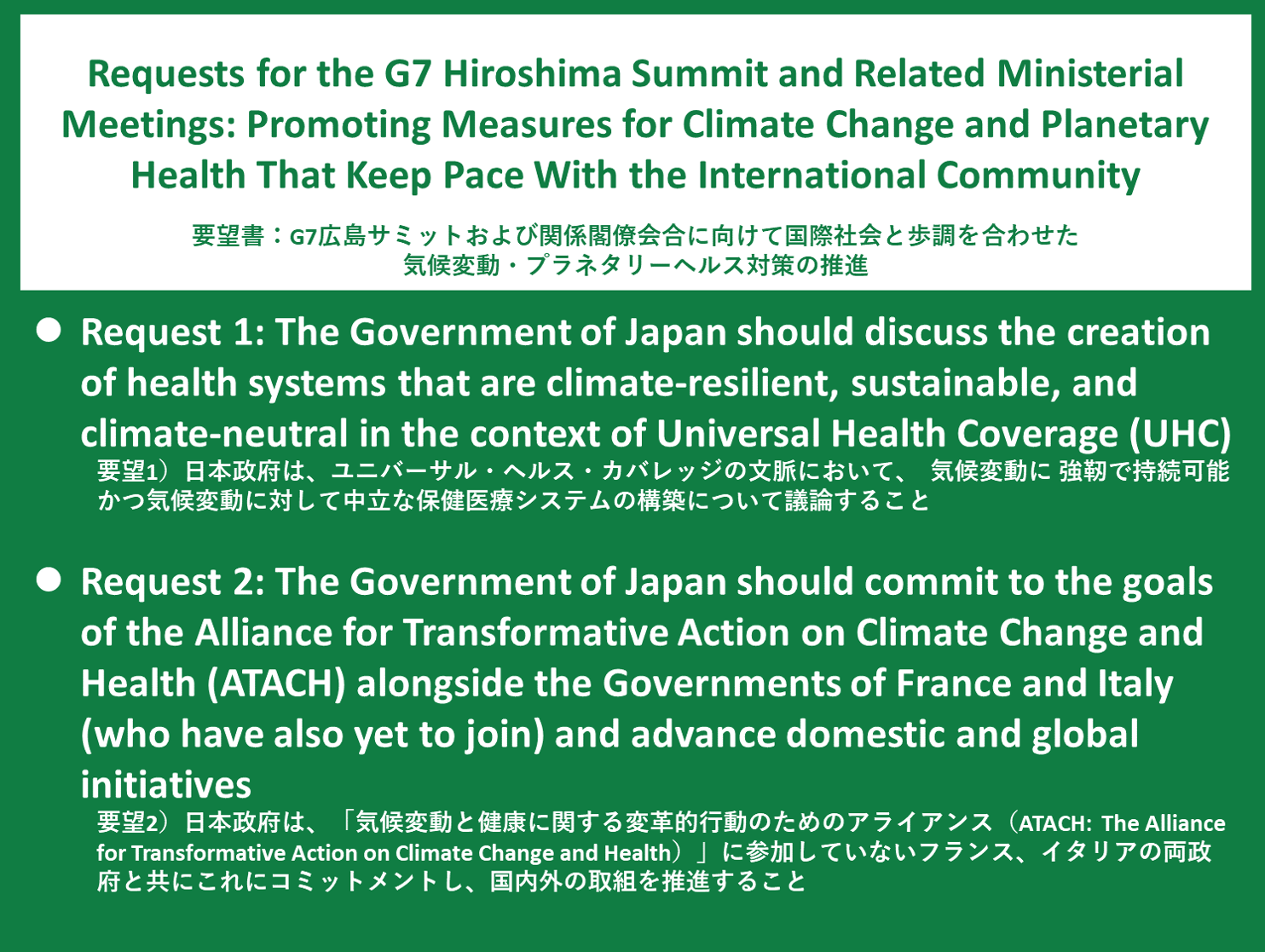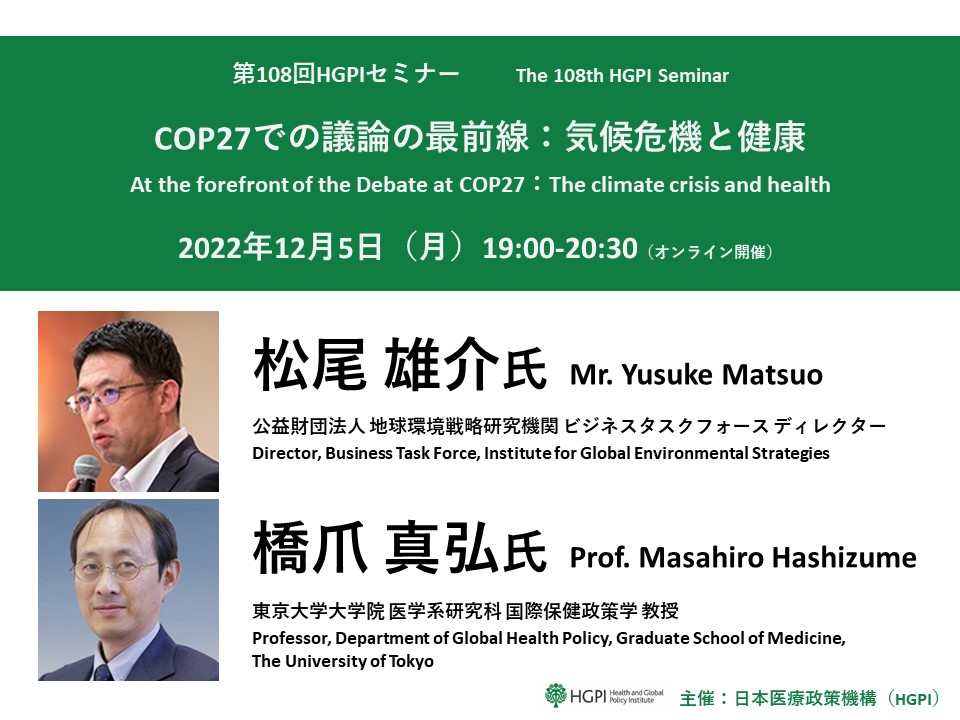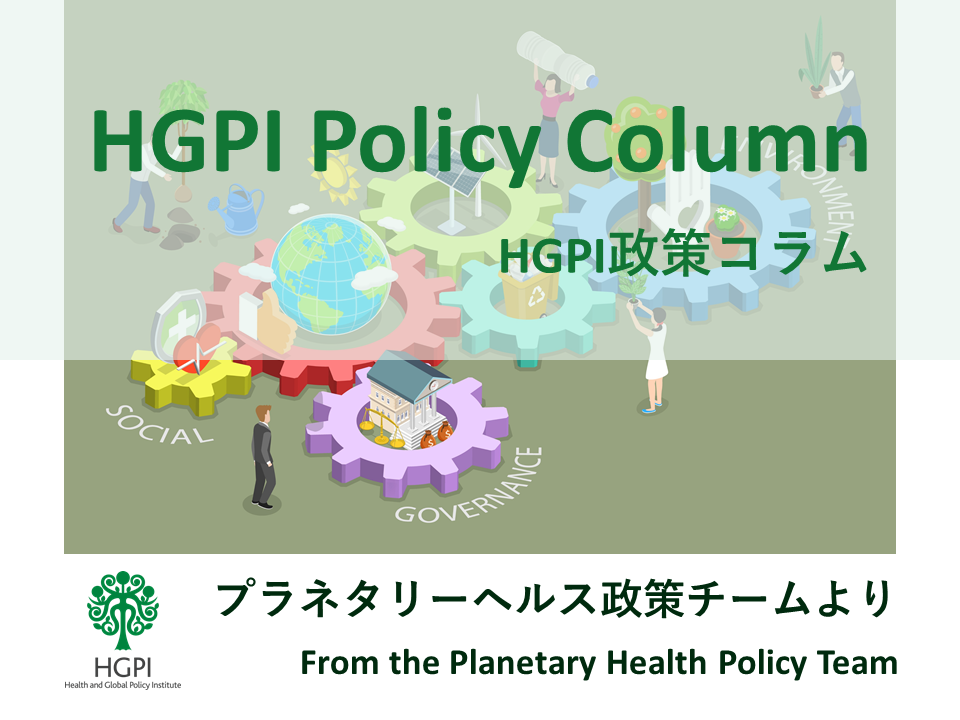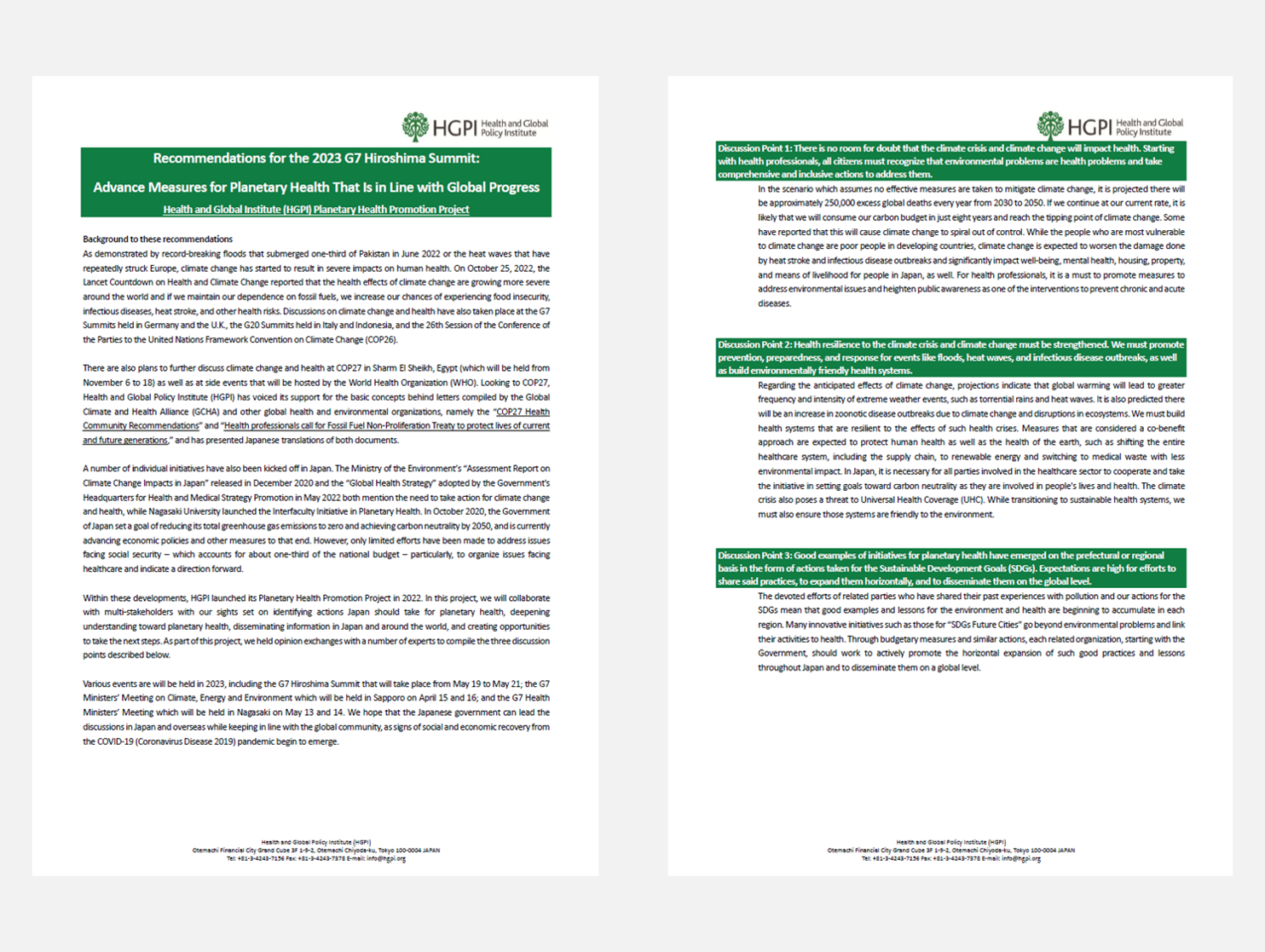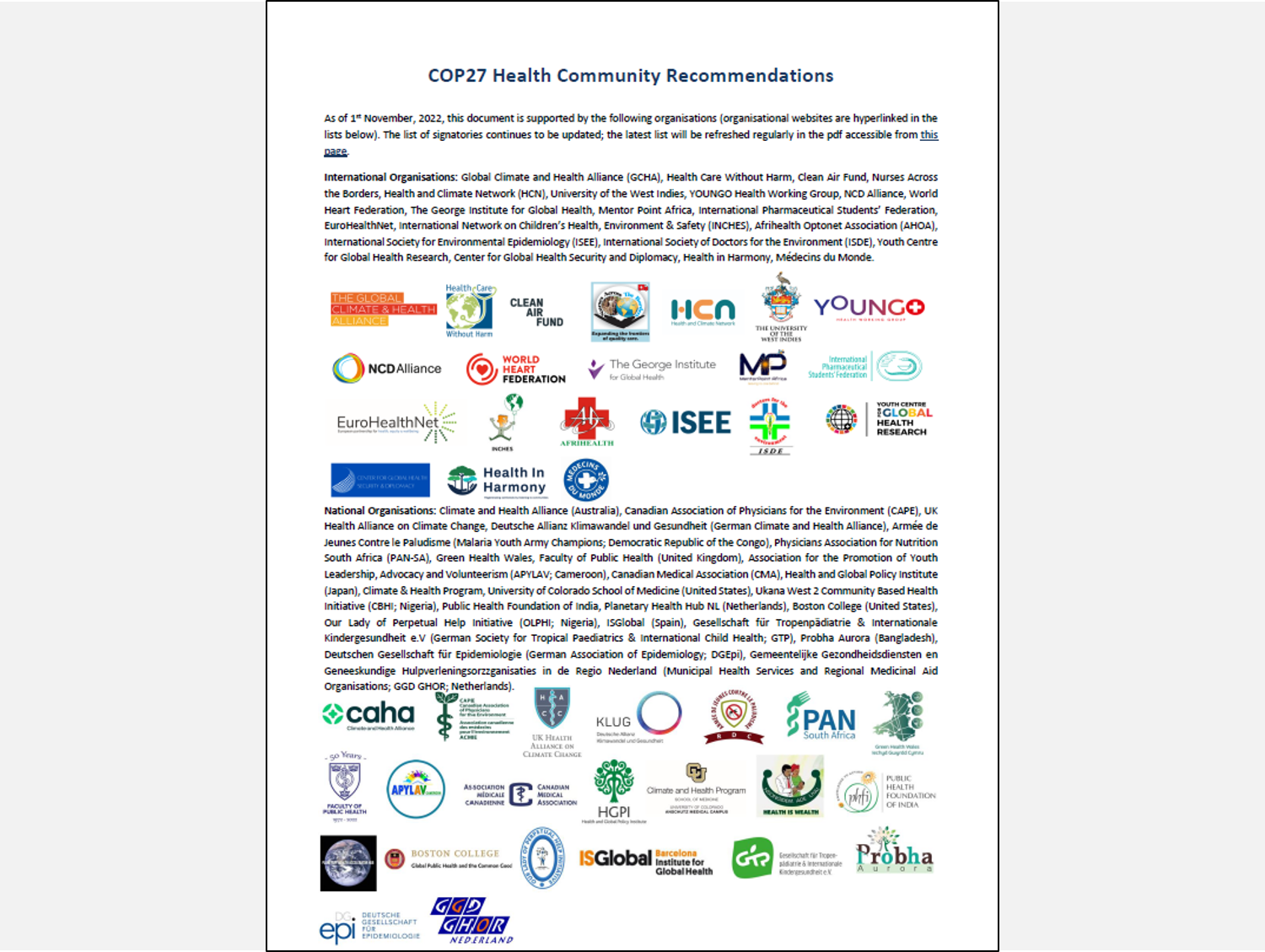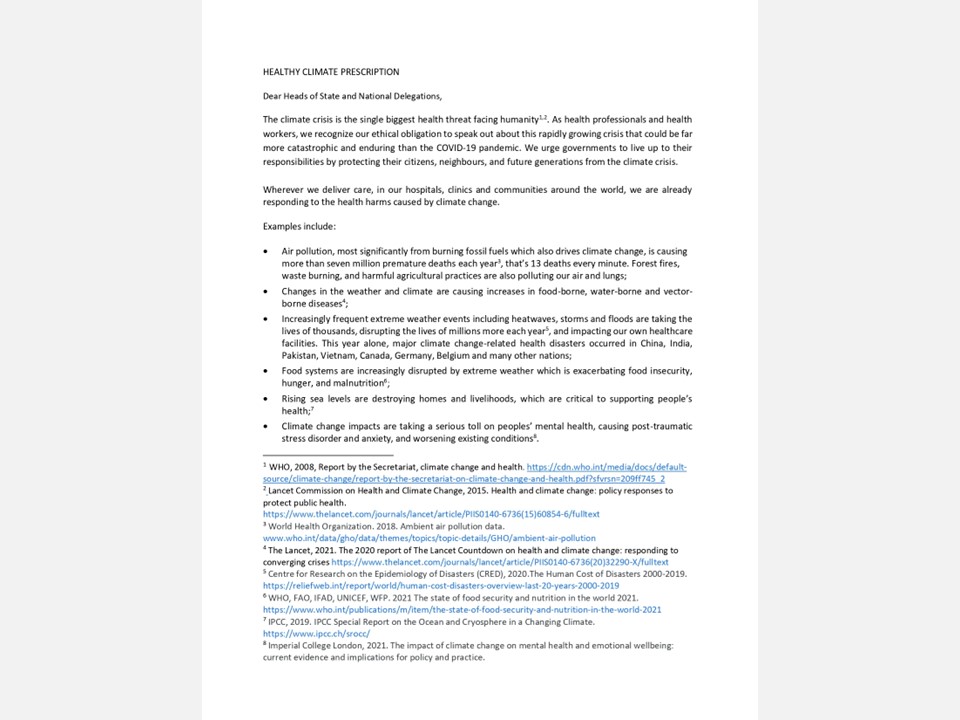[In the Media] What Healthy Climate Prescription Teaches Us: Health Care’s Approach to the Climate Crisis (Min-Iren Iryo, No. 606; February 24, 2023)
date : 3/6/2023
Tags: Global Health, Planetary Health
![[In the Media] What Healthy Climate Prescription Teaches Us: Health Care’s Approach to the Climate Crisis (Min-Iren Iryo, No. 606; February 24, 2023)](https://hgpi.org/en/wp-content/uploads/sites/2/lecture-media-210-top.png)
Health and Global Policy Institute (HGPI) Planetary Health Policy Team contributed a column titled, “What Healthy Climate Prescription Teaches Us: Health Care’s Approach to the Climate Crisis” to the March 2023 issue of Min-Iren Iryo.
The article explains the “Healthy Climate Prescription” letter that HGPI’s Planetary Health Policy Team signed. The article includes an overview of the letter and the events leading up to delivering it to COP 26. Furthermore, the article reviews the new initiatives that began to take shape around the same time the letter was drafted, and recent international developments related to “climate and health.”
What the Healthy Climate Prescription Can Teach Us About Past Efforts for the Climate Crisis from the Health Sector
Health and Global Policy Institute (HGPI) Planetary Health Policy Team
Senior Manager Joji Sugawara
Intern Eri Cahill
Introduction
The cumulative effects of humanity on the Earth are beginning to have significant impacts on our lives and health. Although we recognize the importance of addressing climate change, atmospheric pollution, and other environmental problems at the global scale, as individuals, we may lack opportunities to grasp the relationships between such issues and our daily lives. A 2014 report from the World Health Organization (WHO) titled, “Quantitative risk assessment of the effects of climate change on selected causes of death, 2030s and 2050s” estimated there will be approximately 250,000 additional deaths per year from 2030 and 2050 if effective measures to mitigate global warming are not taken [0].
There have also been a number of reports from both Japan and other countries describing health hazards caused by climate change. For example, record-breaking floods submerged one-third of Pakistan in June 2022. That same summer, Europe also experienced multiple heat waves. In this manner, climate change has started to have severe impacts on social activities, our daily lives, and human health. In October 2010, British medical journal The Lancet published a summary of climate change impacts on human health in Lancet Countdown. The report stated that the effects of climate change are growing more severe around the world and that we place ourselves at greater risk of food insecurity, outbreaks of infectious disease and heat stroke, and other consequences if we maintain our dependence on fossil fuels [1].
As more examples of how altering the Earth’s systems impacts our health continue to emerge, various countries are initiating efforts to build a sustainable relationship between the Earth and humanity. For example, there have been broad discussions at G7 and G20 meetings on the One Health Approach, which aims to analyze human interference on the global climate, environment, biodiversity, and other natural systems and to address the impacts of such interference on human health and all life on Earth under the concept of “planetary health.”
Health and Global Policy Institute (HGPI) was established in 2004 and is a non-profit, independent, non-partisan health policy think tank. HGPI is working in its unique capacity to gather broad stakeholders for discussions that will establish connections between the scattered topics in planetary health and deliver citizen-centered, multi-disciplinary health policies. Focusing on “Climate Change and Health” and the “Healthy Climate Prescription” within discussions on planetary health, this article will provide an overview of recent global developments in this area.
1. Introducing the Healthy Climate Prescription
In 2021, members of the WHO Civil Society Working Group to Advance Action on Climate Change and Health, the Global Climate and Health Alliance (GCHA), and their partners published a letter called the “Healthy Climate Prescription” that was written in response to the 26th Conference of the Parties (COP26) to the United Nations Framework Convention on Climate Change (UNFCCC) in Glasgow, UK [2]. In that Prescription, health specialists and professionals declared they have an ethical obligation to raise their voices about climate change. They name the single greatest health threat facing humanity which poses risks that may be much more devastating and long-lasting than the Coronavirus Disease 2019 (COVID-19) pandemic [3]. The letter issues a strong call to Governments to fulfill their responsibilities by recognizing the threat of climate change and to take action to protect their citizens and members of future generations [3].Figure 1: Examples of existing health harms caused by climate change
- Air pollution is the cause of over 7 million premature annual deaths. This is the equivalent of 13 deaths per minute. The burning of fossil fuels is a major source of such pollution and is a driver of climate change. Forest fires, waste burning, and harmful agricultural practices are also polluting the air and our lungs.
- Weather and climate changes are causing more food-borne, water-borne and vector-borne diseases.
- Frequent extreme weather events like heat waves, storms, and floods are taking the lives of thousands and disrupting the lives of millions every year. They also affect our healthcare facilities. Just in 2021, major climate change-related health disasters occurred in many countries like China, India, Pakistan, Vietnam, Canada, Germany, and Belgium.
- Extreme weather is disrupting food systems, exacerbating problems like food insecurity, hunger, and malnutrition.
- Rising sea levels are destroying homes and livelihoods, which are essential for people’s health.
- Climate change is also having serious impacts on mental health. It is causing conditions like post-traumatic stress disorder (PTSD) or anxiety and is worsening existing health conditions.
Figure 2: “A Call on All Nations”
- Deliver a rapid and just transition away from fossil fuels
- Update national climate commitments, policies, and governance; and incorporate health into those plans
- Invest in and build climate resilient, low-carbon, sustainable health systems
- High income countries should provide funds to low-income countries to help implement necessary measures for climate mitigation, adaptation, and resilience
The Healthy Climate Prescription is now gathering signatures from supporting individuals and organizations. As of December 2022, its signatories included over 600 civil society organizations representing 46 million health professionals as well as over 3,400 individuals from 102 countries [3].
One organization that played a central role in developing the Healthy Climate Prescription was the WHO-Civil Society Working Group for Action on Climate Change and Health, which was established in November 2017 at the request of the Director-General of the WHO [4]. In addition to representatives from the WHO, that Working Group includes members from global NGOs that are working to address climate change through various initiatives including health system reform, research, peer education, advocacy, emergency response, and policy analysis. The other organization involved in the creation of the Prescription was the GCHA, which includes health and development organizations from around the world and was formed after the COP17 in Durban, South Africa in 2011. Its objectives are addressing climate change while protecting and promoting public health. GCHA members are working to close health disparities through climate change mitigation and adaptation measures, to provide support that ensures the health sector sets a good example, and to build awareness of the potential health benefits that can be delivered through appropriate policies to mitigate climate change [5]. In 2022, GCHA partnered with Physicians for Social Responsibility and Health Care Without Harm (HCWH) to draft a letter calling for a non-proliferation treaty on fossil fuels from the perspectives of health specialists [6].
2. Background to the creation of the Healthy Climate Prescription
When COP26 was held in 2009, it was the most high-profile meeting in the field of health ever held by the Conference of the Parties to the United Nations Framework Convention on Climate Change (UNFCCC) [7]. This was accompanied by many other activities encompassing perspectives on health. In addition to the Healthy Climate Prescription which was presented there, the WHO also hosted its first Health Pavilion, a side event from specialists and professionals serving in the field of health to share WHO survey results for COP26. In its capacity as host of the COP26, the UK government also presented the COP26 Health Programme, which called on each country to commit to taking action on climate change and health [8].COP26 was postponed for one year due to the COVID-19 pandemic, an event that put a spotlight on existing health systems’ vulnerabilities and inequalities [9, 10]. It also drew attention to their capacity for responding to infectious disease outbreaks and other health hazards resulting from global climate problems, which are expected to occur more frequently in the future. This was also encouraged by actions from the health community like the Healthy Climate Prescription from the WHO and GCHA as well as from the UK government in its capacity as host of COP26.
In addition to hosting COP26, the UK government had also been taking action for its domestic health sector since prior to COP26. In October 2020, the National Health Service (NHS) in the UK became the world’s first health insurance system to set a goal of achieving net-zero carbon emissions [11]. At COP26, the health community positioned human health at the forefront of efforts to address climate change. The COP26 Health Programme was promoted for the first time in negotiations held at the United Nations Framework Convention on Climate Change (UNFCCC) by the UK government acting as COP26 host, as well as by WHO, HCWH, and the UN Climate Change High-Level Champions. This initiative aims to promote health systems that are low-carbon, sustainable, and resilient to climate change, and as of December 2022, health ministers from a total of 62 countries have endorsed one or both of its commitments [12].
To ensure these commitments lead to action, the COP26 Health Programme also established the Alliance for Transformative Action on Climate and Health (ATACH) with WHO as its secretariat. ATACH was launched as a WHO initiative to share opinions and information; to reinforce technical and political cooperation; and to encourage making climate change a global priority. Its functions include monitoring, financing, and knowledge sharing and coordinating access to technical assistance for participating governments and organizations [13].
3. Support for this issue from the health sector and necessary actions for the G7 Hiroshima Summit
In this article, we have provided an overview of the Healthy Climate Prescription, events that led up to its creation, and new initiatives that began around the time it was drafted. In addition to medical journals like British Medical Journal and The Lancet, the Healthy Climate Prescription has been endorsed by professional associations like the World Medical Association (WMA), the World Organization of Family Doctors (WONCA), the International Council of Nurses (ICN), and the International Pharmaceutical Federation (FIP). It is also supported by student organizations whose members will shoulder society for the next generation like the International Federation of Medical Students’ Associations (IFMSA) and the International Veterinary Students’ Association (IVSA) [3].In 2023, Germany will pass the role of G7 host to the Government of Japan. The G7 Hiroshima Summit will be held from May 19 to May 21. Ahead of that event, the G7 Ministers’ Meeting on Climate, Energy and Environment will take place in Sapporo on April 15 and 16 and the G7 Health Ministers’ Meeting will be held in Nagasaki on May 13 and 14 [14]. In his address at the Seventy-Seventh Session of the United Nations General Assembly on September 20, 2022, Prime Minister Kishida expressed Japan’s strong commitment to the UN and multilateralism, declaring Japan will “strengthen efforts based on the concept of human security in the new era.” When doing so, Japan will provide leadership in achieving Universal Health Coverage (UHC) based on the needs of a new, post-COVID-19 era to overcome conditions facing a world where climate change and other issues are interconnected and growing more complex [15].
The issues of climate and human health are now topics of interest in Japan. While domestic support for the Healthy Climate Prescription is still limited, considering that we also faced problems like natural disasters and heat stroke due to climate change, we hope that all stakeholders in healthcare and medicine become aware of this issue, speak up, and begin serving as leaders in efforts to reform society.
[0] Quantitative risk assessment of the effects of climate change on selected causes of death, 2030s and 2050s (2014, September), World Health Organization.
[1] 2022 Report – Lancet Countdown (2022, October), Lancet
[2] Healthy Climate Prescription – What’s next? (2022, April). Global Climate and Health Alliance YouTube Channel.
[3] Healthy Climate Prescription (2021). #Healthy Climate Prescription.
[4] Collaborating with civil society to Advance Action on Climate Change (n.d.). World Health Organization.
[5] Our history. (n.d.) The Global Climate and Health Alliance.
[6] Health Professionals Call for a Fossil Fuel Treaty? The Fossil Fuel Non-Proliferation Treaty Initiative
[7] Laybourn-Langton L, Smith R. COP26 and Health: Some Progress, but Too Slow and not Enough. (2022, January) Balkan Med J.
[8] What has COP26 achieved for health? (2022, November). World Health Organization.
[9] Quintana, Amanda V, Rashmi Venkatraman,Samantha Brandon Coleman, Diogo Martins, and Susannah H Mayhew. COP26: An Opportunity to Shape Climate-Resilient Health Systems and Research. (2021, November). The Lancet Planetary Health.
[10] Call for papers related to public health, climate change, and ecological futures. (n.d.).? (open-ended). Canadian Journal of Public Health.
[11] Greener NHS (n.d.). NHS England.
[12] COP26 Health Programme (n.d.). Alliance for Transformative Action on Climate and Health (ATACH), World Health Organization.
[13] Alliance for Transformative Action on Climate and Health (ATACH). (n.d.). Alliance for Transformative Action on Climate and Health (ATACH), World Health Organization.
[14] [Official]G7 Hiroshima Summit 2023
[15] Address by Prime Minister Kishida at the Seventy-Seventh Session of the United Nations General Assembly, Ministry of Foreign Affairs of Japan
For more information, please see here.
*Available only in Japanese
Top Research & Recommendations Posts
- [Policy Recommendations] The Path to a Sustainable Healthcare System: Three Key Objectives for Public Deliberation (January 22, 2026)
- [Research Report] The 2025 Public Opinion Survey on Healthcare in Japan (March 17, 2025)
- [Research Report] Perceptions, Knowledge, Actions and Perspectives of Healthcare Organizations in Japan in Relation to Climate Change and Health: A Cross-Sectional Study (November 13, 2025)
- [Policy Recommendations] Reshaping Japan’s Immunization Policy for Life Course Coverage and Vaccine Equity: Challenges and Prospects for an Era of Prevention and Health Promotion (April 25, 2025)
- [Research Report] The 2023 Public Opinion Survey on Satisfaction in Healthcare in Japan and Healthcare Applications of Generative AI (January 11, 2024)
- [Research Report] AMR Policy Update #4: Cancer Care and AMR (Part 1)
- [Public Comment Submission] “Assessment Report on Climate Change Impacts in Japan (Draft Overview)” (December 24, 2025)
- [Policy Recommendations] Developing a National Health and Climate Strategy for Japan (June 26, 2024)
- [Research Report] The Public Opinion Survey on Child-Rearing in Modern Japan (Final Report) (March 4, 2022)
- [Research Report] Survey of Japanese Physicians Regarding Climate Change and Health (December 3, 2023)
Featured Posts
-
2026-01-09
[Registration Open] (Hybrid Format) Dementia Project FY2025 Initiative Concluding Symposium “The Future of Dementia Policy Surrounding Families and Others Who Care for People with Dementia” (March 9, 2026)
![[Registration Open] (Hybrid Format) Dementia Project FY2025 Initiative Concluding Symposium “The Future of Dementia Policy Surrounding Families and Others Who Care for People with Dementia” (March 9, 2026)](https://hgpi.org/en/wp-content/uploads/sites/2/dementia-20260309-top.png)
-
2026-02-05
[Registration Open] (Webinar) The 141st HGPI Seminar “Current Status and Future Prospects of Korea’s Obesity Policy: Voices of People with Lived Experience in Policy Promotion” (March 3, 2026)
![[Registration Open] (Webinar) The 141st HGPI Seminar “Current Status and Future Prospects of Korea’s Obesity Policy: Voices of People with Lived Experience in Policy Promotion” (March 3, 2026)](https://hgpi.org/en/wp-content/uploads/sites/2/hs141-top-1.png)
-
2026-02-06
[Research Report] AMR Policy Update #5: Cancer Care and AMR (Part 2)
![[Research Report] AMR Policy Update #5: Cancer Care and AMR (Part 2)](https://hgpi.org/en/wp-content/uploads/sites/2/HGPI_20260204_AMR-Policy-Update-5.png)





